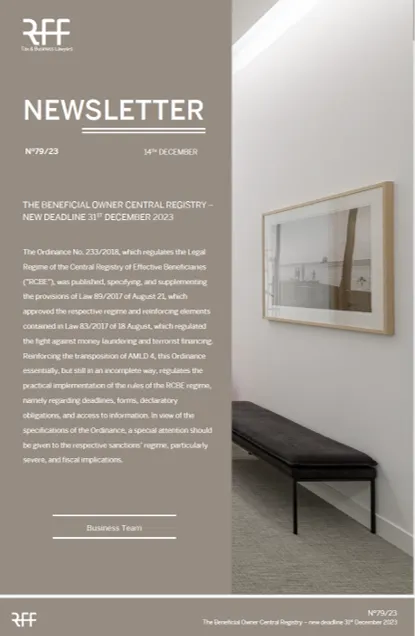The Beneficial Owner Central Registry – new deadline 31st December 2023

The Beneficial Owner Central Registry – new deadline 31st December 2023
The Ordinance No. 233/2018, which regulates the Legal Regime of the Central Registry of Effective Beneficiaries ("RCBE"), was published, specifying, and supplementing the provisions of Law 89/2017 of August 21, which approved the respective regime and reinforcing elements contained in Law 83/2017 of 18 August, which regulated the fight against money laundering and terrorist financing. Reinforcing the transposition of AMLD 4, this Ordinance essentially, but still in an incomplete way, regulates the practical implementation of the rules of the RCBE regime, namely regarding deadlines, forms, declaratory obligations, and access to information. In view of the specifications of the Ordinance, a special attention should be given to the respective sanctions’ regime, particularly severe, and fiscal implications.
FRAMEWORK
The Ordinance No. 233/2018 was published on 21st August 2018, which regulates the Legal Regime of the Central Registry of Effective Beneficiaries (BOCR).
This regulation was published one year after the publication of Law no. 89/2017 of 21st August, which approved the Legal Regime of Beneficial Owner Central Registry (BOCR) and transposed into our legislation a part of the Directive (EU) 2015/849 on the prevention of the use of the financial system for the purpose of money laundering or terrorist financing, commonly referred to as the 4th Prevention of Money Laundering and Terrorism Financing Directive (AMLD 4).
The Central Register of the Beneficiary is based on a repository of data, containing accurate and up-to-date information on the actual beneficiaries of certain entities.
The BOCR is primarily a tool under AMLD 4 to prevent and combat money laundering and terrorist financing.
However, in the second line and in line with the adoption of Directive 2016/2258 (DAC 5), which allows access to and exchange of this information between tax administrations in the Member States of the European Union and thereby increase the scrutiny to which planning activities are subject, as well as the tax advice which previously escaped such control.
The combination of the BOCR and the DAC 5 and, on the other hand, the Directive 2017/822 (DAC 6), which aims to combat abusive tax planning, mainly through the dissemination of tax schemes on the part of intermediaries, results in an increased accountability of the intermediaries who carry out these illicit schemes and, on the other hand, increase the transparency regarding the detention of entities.
THE OBJECT OF REGULATION
In this context, Ordinance No. 233/2018, of 21th August, hereto, regulates the Legal Regime of the BOCR established through said Law no. 89/2017, in particular, and in general terms:
- the effective beneficiary’s declaration form, which, although not yet available, will be made available online, providing various forms of authentication (eg citizen card, digital mobile key, professional certificates and professional attributes);
- the circumstances that initiated the status of beneficial owner, which will be specified in the forms and which must meet the provisions of Law No. 83/2017, which introduced in Portuguese law other parts of the AMLD;
- the deadline for carrying out the necessary communications to BOCR by the Central Registry of Legal Entities, officially and immediately after the registration of the entity to the File, and the Tax Administration, until 31st October 2018 regarding the pre-existing entities and daily in relation to the rest, insofar as these entities should contribute to popular the initial universe of entities registered in the BOCR;
- the form of public disclosure of information concerning the actual beneficiaries of the subject entities, as well as the authentication procedures and search criteria;
- the terms of extracting information and certificates from the database;
- the deadline for the submission of the first declaration for entities subject to the BOCR already existing; and
- the form and the deadline for communication by the entities obliged to the sectoral authorities to identify the entities.
On the other hand, the Ordinance analyzed here also specifies other aspects arising from Law 83/2017, of 18th August, on combating money laundering and terrorist financing, namely by providing for an obligation to regularly consult information made available in the BOCR, by the obligated entities, [1] under the terms of this Law.
Although regarding the procedure, the Ordinance is incomplete when it comes to the elements necessary for the correct implementation of the scheme, in particular, the forms and the exchange of information between local authorities.
1] A wide range of financial and non-financial entities provided for in Law 83/2017, introducing other parts of AMLD 4 into the Portuguese legal framework, that are obliged to identify the beneficial owner(s) of their clients.
THE PREPARATORY WORK
With the implementation of the BOCR, the obligated entities not only have to comply with their own declarative obligation, but also have a preparatory work to first determine who the effective beneficiaries are and then obtain and organize the information about themselves.
The beneficial owner is not an obvious position, since the percentage of shares or of shares in the share capital may not be sufficient to determine who owns or controls a legal person. This is the reason why the indicative factors will be available within the forms themselves.
Once their actual beneficiaries have been determined, obligated entities should keep an up-to-date, sufficient, and accurate record of the information and data they are obliged to report regularly (within a maximum of 30 days) to the BOCR.
The obligated entities are also responsible for the accuracy and updating of the information contained in the Registry and must, within 10 days, communicate any inaccuracy, omission, nonconformity, or outdatedness.
THE PENALTIES ARISING FROM LAW NO. 89/2017
In this context, it is recalled that failure to comply with these obligations by the entities subject to effective beneficiaries is subject to the application of particularly severe sanctions.
On the one hand, a fine of between € 1,000 and € 50,000 can be imposed, but above all, if compliance with the declaratory and rectification obligations is not observed, the obligated non-complying entities are severely limited in their activity and functioning.
In fact, where the entity is in breach of the requirements of the BOCR regime, the entity subject to BOCR may not, in particular, distribute profits or make advances on profits during the year, enter into supply contracts, public works contracts or purchase of services and goods with public entities, renew the term of existing contracts, nor can it compete for the concession of public services, receive support from European structural and investment funds and public, or intervene as part of any business which has as its object the transfer of the property, whether for a consideration or free of charge, or the constitution, acquisition or disposal of any other rights of real enjoyment or security over any immovable property.
In addition, the declaratory non-compliance is registered in the Commercial Register, and this information is only eliminated when the default situation ceases.
It should not be forgotten that anyone who provides false declarations for the purposes of registering the beneficial owner can still be criminally and civilly liable.
In this context and given the weight of the sanctions provided for in the BOCR regime, attention should be drawn to the deadlines and specification of the respective obligations, as set out in Ordinance 233/2018.
OTHER FISCAL IMPLICATIONS
In addition to the implications and sanctions mentioned above, there are other possible fiscal ones.
Through the infrastructure of access and exchange of information between tax Administrations, particularly through the above-mentioned CARs 5 and 6, there will be a more incisive inspection that will promote a more enlightened application of anti-abuse tax rules, such as the general clause anti-abuse under the General Tax Law, as the Principal Purpose Test, provided for in the Anti-Tax Abuse Directive (ATAD) and under the Double Taxation Conventions, in the Multilateral Instrument.
Potential facilitation of the application of special anti-abuse standards include:
- fiscal imputation of income and the flow through tax treatment of income held in companies that qualify as Controlled Foreign Company (CFC);
- the concept of a beneficial owner for the purposes of the Double Taxation Conventions and, where appropriate, the European Tax Directives, while emphasizing the historical distinction between the ultimate beneficial owner of an entity (UBO) and beneficial owner of a transaction, with an international interpretative and jurisprudential tradition in this respect, which does not necessarily associate one concept with another.
THE DECLARATORY DEADLINES
Among the regulated aspects, we note the determination that the entities subject to the BOCR [2] already constituted on the date of entry into force of the Ordinance, on 1st October 2018, are obliged to make the initial declaration regarding the beneficial owner within 30 days after the completion of the registry of the company.
Additionally, and pursuant to the obligation to update the ultimate beneficial owner declaration on an annual basis, the deadline for fulfilling the abovementioned obligation with the BOCR terminates on 31st December 2023.
[2] a) Associations, cooperatives, foundations, civil and commercial societies, as well as any other personalized collective agreements, subject to Portuguese law or foreign law, that carry on an activity or practice a legal act or business in the national territory that determines the obtaining of a number Tax Identification Number (NIF) in Portugal; b) Representations of international legal persons or of foreign law that are active in Portugal; c) Other entities which, pursuing their own objectives and activities different from those of their associates, are not endowed with legal personality; d) The fiduciary management instruments registered in the Madeira Free Trade Zone (trusts); e) External financial branches registered in the Madeira Free Trade Zone; and e) Trust funds and other legal arrangements, with a similar structure or functions, where they do not fall within the previous entities, where circumstances arise.
***
Rogério Fernandes Ferreira
Marta Machado de Almeida
Patrícia Largueiras
Luís Almeida Brito
Inês Dias de Pinho
